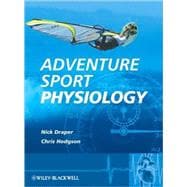
Note: Supplemental materials are not guaranteed with Rental or Used book purchases.
Purchase Benefits
What is included with this book?
Dr Nicholas Draper, Principal Lecturer, School of Physical Education, University of Chichester, UK
Nick has considerable teaching experience in both the UK and the US. He is a qualified coach in kayaking and mountaineering and for three years was the performance planner for the British judo team. Nick's research interests include coaching and sports science support as they relate to the Adventure and Physical Education Domains.
Mr Christopher Hodgson, Senior Lecturer, School of Physical Education, University of Chichester, UK
Chris is a fully qualified member of the International Association of Ski Instructors, a British Canoe Union Level V Coach and has taught and led adventurous activity programmes in North America, Europe, Africa and India. Chris' research interests include human performance during environmentally induced stress, the enhancement of adventure sports performance and the experience of adventure activities.
| Acknowledgements | |
| Preface | |
| The Foundations of Adventure Sport Physiology | |
| A Historical Perspective: The Context of Adventure Physiology | |
| The earliest physiologists | |
| The founders of exercise physiology | |
| The development of environmental physiology | |
| The origins of adventure physiology | |
| The development of adventure sports | |
| Nutrition for Health and Performance | |
| Introduction to nutrition | |
| Carbohydrates | |
| Fats | |
| Proteins | |
| Vitamins | |
| Minerals | |
| Water | |
| The Structure and Functioning of the Human Body | |
| The cellular basis for life | |
| Skeletal system | |
| Nervous system | |
| Endocrine system | |
| Summary and study questions | |
| Fundamental Systems for Adventure Sports | |
| Muscular system | |
| Respiratory system | |
| Cardiovascular system | |
| Energy systems | |
| Summary and study questions | |
| Training Fundamentals | |
| Introduction to training methodology | |
| Developing and designing training programmes | |
| Summary and study questions | |
| The Physiological Demands of Adventure Sports | |
| Power and Power Endurance: The Explosive Activities | |
| Introduction | |
| Muscle fibre types | |
| The phosphagen system | |
| Physiological response to power and power endurance activities and fatigue | |
| Physiological adaptations to power training | |
| Nutritional ergogenic aids to power performance | |
| Summary and study questions | |
| Anaerobic Endurance: The Lactate Tolerance and Management Activities | |
| Introduction | |
| Glycolysis | |
| Physiological response to anaerobic endurance activities and fatigue | |
| Physiological adaptations to anaerobic endurance training | |
| Nutritional ergogenic aids to anaerobic performance | |
| Sport-specific physiology | |
| Summary and study questions | |
| The Intermittent Adventure Activities | |
| Introduction | |
| Physiology of intermittent activities | |
| Training and recovery in intermittent activity | |
| Nutrition and ergogenic aids for intermittent activities | |
| Water immersion | |
| The physiology of water-based adventure sports | |
| Summary and study questions | |
| Aerobic Endurance I: The High-Intensity Activities | |
| Introduction | |
| Aerobic-anaerobic transition and lactate threshold | |
| Physiological response to high-intensity endurance activities | |
| Physiological adaptations to training | |
| Nutritional ergogenic aids to aerobic performance | |
| Physiological challenge of thermal stress | |
| The physiology of land-based adventure sports | |
| The physiology of water-based adventure sports | |
| Summary and study questions | |
| Aerobic Activities II: Lower Intensity Endurance Activities | |
| Introduction | |
| Aerobic system | |
| Physiological response to lower intensity endurance activities | |
| Physiological adaptations to training | |
| Nutritional ergogenic aids to aerobic performance | |
| The effects of hyperbaric and hypobaric condition on performance | |
| The physiology of mountaineering | |
| Summary and study questions | |
| References | |
| Index | |
| Table of Contents provided by Publisher. All Rights Reserved. |
The New copy of this book will include any supplemental materials advertised. Please check the title of the book to determine if it should include any access cards, study guides, lab manuals, CDs, etc.
The Used, Rental and eBook copies of this book are not guaranteed to include any supplemental materials. Typically, only the book itself is included. This is true even if the title states it includes any access cards, study guides, lab manuals, CDs, etc.